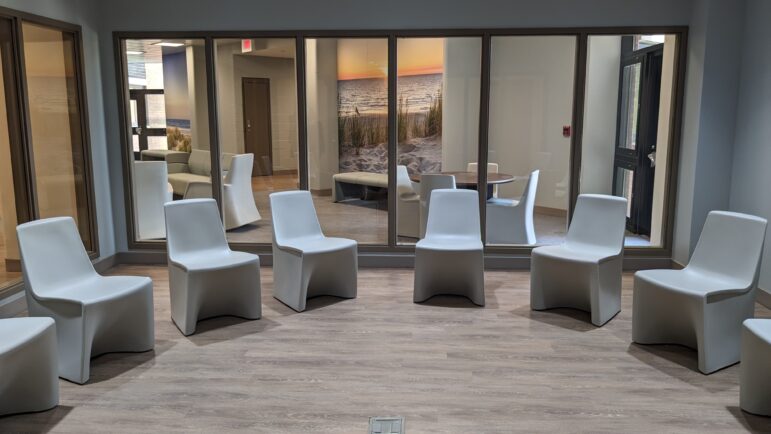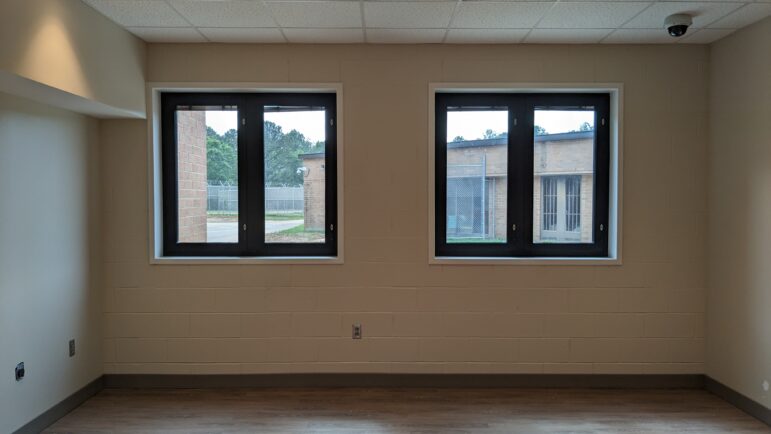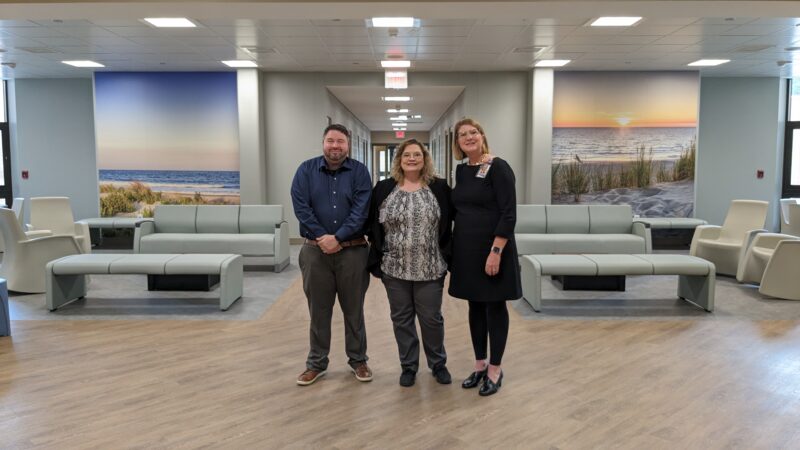Alabama officials hope renovated forensic mental health hospital will reduce backlog in county jails
Mark Litvine (L), Daphne Kendrick and Virginia Scott-Adams stand in a program day room, part of the newly constructed section of Taylor Hardin.
For the first time in more than four decades, Taylor Hardin Secure Medical Facility is getting a makeover.
The Tuscaloosa facility, built in 1981, cares for people involved in Alabama’s court system who need mental health treatment. And according to psychologist Virginia Scott-Adams, it reflects an outdated model of care.
“The design of the building was based more on security, so it looks and feels more correctional,” said Scott-Adams, who directs the Office of Forensic Mental Health Services at the Alabama Department of Mental Health (ADMH). “Now, we’ve come to learn about the importance of more therapeutic environments.”
That’s the inspiration behind an ongoing $80 million renovation and expansion to the facility.
Officials hope the improvements lead to better – and faster – outcomes for people who spend months in county jails waiting for treatment.
A hospital, not a jail
Inside the original hallways of Taylor Hardin, sounds echo off the walls, which are lined with heavy metal doors and windows covered with bars.
Facility director Daphne Kendrick unlocks a door, revealing a new area under construction.
“The hallways are much wider. It’s just a more open format,” she said.
The new building is brighter, with windows made from a special glass that doesn’t require bars. The walls are decorated with large murals that feature beach scenes.
Kendrick said it’s carefully designed.
“The colors are set to be therapeutic, calming,” she said. “There’s a lot of light and open areas.”
She said the department wants to make it clear that “this is a hospital, not a jail.”

Competency restoration
Most patients at Taylor Hardin, roughly 75% of the population, are at the facility for inpatient competency restoration.
They have been arrested and charged with crimes, but because of a mental health condition or cognitive impairment, a judge has determined that they are not able to fully understand and participate in the court process.
These individuals typically receive inpatient treatment for several months, before they are considered to be restored and allowed to continue their case.
Scott-Adams said Taylor Hardin has long struggled to keep up with demand, sparking a class action federal lawsuit several years ago.
Recently, the population has been increasing even more.
“If you’re looking at a snapshot of this spring, we received around 30 orders for the month of April, and typically we were receiving about 15 to 20,” Scott-Adams said.
The backlog has resulted in a lengthy waitlist, with people spending months in county jails awaiting a bed at Taylor Hardin.
The experience can worsen their condition.
“When I was in jail, my mental health wasn’t being treated for six months,” said Mark Litvine, who was arrested in Jefferson County in 2012, while experiencing symptoms of schizoaffective disorder. “I would act out, but I would also get jumped. I would walk to the bathroom or get punched. I’ve been choked. I’ve been spit on.”
Litvine eventually transferred to Taylor Hardin and started receiving an antipsychotic medication that helped him stabilize.
State mental health officials hope renovations at Taylor Hardin will help people like Litvine get treatment sooner.
A new model of care
Facility director Kendrick said she expects to move existing patients to the new building at Taylor Hardin within the next few months. At that point, work will begin to renovate the original building, which should be complete by summer of 2025.
When all construction is complete, capacity will increase by about 60%, from 140 to 225 beds.
Scott-Adams said the department is trying to hire more staff to accommodate the expansion. She hopes a more therapeutic space will lead to better outcomes.
“We’re building out a model where patients come in and they’re immersed in treatment and they’re immersed in restoration,” Scott-Adams said. “It creates opportunities for people to achieve those gains more quickly.”

Beyond the walls of Taylor Hardin, state mental health officials are also piloting programs to provide competency restoration services to people while they are in county jails and in the community on bond. If successful, it could help some people recover sooner, reducing demand on Taylor Hardin.
40 years after ‘Purple Rain,’ Prince’s band remembers how the movie came together
Before social media, the film Purple Rain gave audiences a peak into Prince’s musical life. Band members say the true genesis of the title song was much less combative than the version presented in the film.
Park Fire in California could continue growing exponentially, Cal Fire officer says
Cal Fire has confirmed that over a hundred structures have been damaged in the Park Fire, which grew overnight near Chico, Calif. Difficult firefighting conditions are forecast through Friday night.
Checking in with Black voters in Georgia about the election, now that Biden is out
Some voters who could be key to deciding who wins Georgia. What do they think about Vice President Harris becoming the frontrunner in the race to be the Democratic nominee?
Tahiti’s waves are a matter of ‘life and death’ for surfing Olympics
Tahiti's Teahupo'o wave has a slew of riders for the Paris 2024 Olympics. NPR finds out why it's called one of the most dangerous waves.
Researchers are revising botanical names to address troubling connotations
Since the mid-1700s, researchers have classified life with scientific names. But some of them have problematic histories and connotations. The botanical community is trying to tackle this issue.
A spectacular opening ceremony wowed a global audience despite Paris’ on-and-off rain
The Paris Olympics opening ceremony wowed Parisians, fans and most everyone who was able to catch a glimpse of thousands of athletes floating down the Seine to officially begin the Games.



